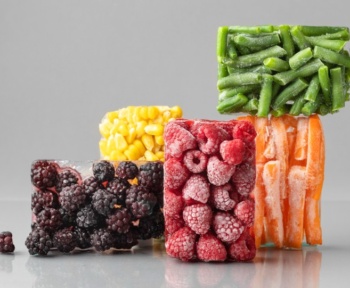As a compassionate dog owner, you want to provide your pet with the safest and healthiest diet possible. For the average person, eating dried fruit as a snack may seem relatively healthy for humans, but is this true for your dog? Can dogs eat dried fruit? This could be further complicated, but the answer is yes or no. Some dried fruits are healthy for dogs, while others can be harmful or toxic.
We will cover the safety, potential health benefits, and risks of sharing dried fruits with your dog, as well as specific tips on how to help ensure this type of treat is safe for your furry friend.
What Are Dried Fruits?
Dried fruits have had most of their water content removed through drying methods like sun-drying or dehydrating. This process concentrates the fruit’s sugars, making them sweeter than fresh ones.

Infographic: Nutritional Comparison of Fresh Fruits vs. Dried Fruits
Fresh fruits generally contain more water and are lower in sugar by volume, while dried fruits are more calorie-dense. Here’s a quick breakdown:

Can Dogs Eat Dried Fruit?
The short answer is that some dried fruits are safe, while others can be toxic. Here’s a closer look at the dried fruits that are safe for your dog and those you should avoid.
Safe Dried Fruits for Dogs
While most dried fruits should be given sparingly, some can be safely enjoyed by your dog:
- Dried Apples: A great source of fiber, dried apples without seeds are safe.
- Dried Bananas: Bananas are a healthy treat rich in potassium and fiber.
- Dried Blueberries: Packed with antioxidants, these are an excellent choice for dogs in small amounts.
- Dried Mango: As long as there’s no pit, dried mango is safe and provides vitamins.
Dried Fruits to Avoid
Some dried fruits are dangerous for dogs and can lead to serious health issues:
- Raisins: Even small amounts can be toxic and lead to kidney failure.
- Dried Grapes: Similar to raisins, these can cause severe toxicity.
- Dried Apricots: The seeds contain cyanide, which is toxic to dogs.
- Dried Cherries: Like apricots, they contain cyanide and should be avoided.
Nutritional Benefits and Risks of Dried Fruits for Dogs
Benefits of Feeding Dried Fruits to Dogs
Dried fruits can provide some nutritional benefits for dogs if served in moderation:
- Fiber: Dried fruits like apples and bananas are high in fiber, which aids digestion.
- Vitamins & Minerals: Dried fruits can be a source of vitamins such as vitamins A and C and minerals like potassium.
- Antioxidants: Dried blueberries are rich in antioxidants that can support immune function.
Potential Risks
However, the high sugar content in dried fruits can cause several issues:
- Obesity and Weight Gain: The concentrated sugars in dried fruits can quickly add calories, leading to obesity.
- Digestive Issues: Dried fruits can cause gastrointestinal upset, especially if eaten in large quantities.
- Toxicity: Fruits like raisins, grapes, and apricots are toxic to dogs, and even small amounts can cause severe reactions.
How to Safely Feed Dried Fruit to Your Dog
Step-by-Step Guide to Safely Introducing Dried Fruits
- Start Small: Introduce dried fruits slowly and in small amounts to observe any adverse reactions.
- Check for Allergies: Monitor your dog for any signs of allergies, like itching or digestive issues.
- Portion Control: Keep servings small and infrequent to prevent excessive sugar intake.
- Avoid Additives: Ensure your dried fruits are free from added sugars or preservatives.
- Remove Seeds and Pits: Always remove seeds and pits, as they can be toxic or pose choking hazards.
Checklist: Safe Practices for Feeding Dried Fruits
- Choose dried fruits without added sugars or preservatives.
- Permanently remove any seeds, pits, or stems.
- Feed only small portions occasionally.
- Monitor for any adverse reactions.
Expert Interview: What Do Veterinarians Say About Dried Fruits for Dogs?
We spoke with Dr. Sarah Thompson, a veterinarian with over 15 years of experience in pet nutrition. Here’s what she had to say:
“While certain dried fruits like apples and bananas can be healthy treats, they should never make up a large portion of your dog’s diet. The biggest risk comes from dried fruits that are toxic, like raisins and apricots, which can lead to serious health complications. Always consult with your vet before introducing new foods into your pet’s diet.”
Dr. Thompson emphasizes the importance of moderation and knowledge of the fruits you’re giving your dog. She also warns about the hidden dangers of store-bought dried fruit mixes, which may contain harmful ingredients.
Common Myths About Dogs and Dried Fruits
Many things could be improved when it comes to feeding dried fruit to dogs. Let’s address some common myths:
- Myth: All fruits are safe for dogs.
- Fact: Many fruits, especially dried varieties like raisins and apricots, can be toxic.
- Myth: Dried fruits are as healthy for dogs as fresh fruits.
- Fact: Dried fruits have higher concentrations of sugar and calories, which can lead to obesity if not fed carefully.
Debunking these myths is essential to keep your dog healthy and safe.
Healthier Alternatives to Dried Fruits
If you’re concerned about the risks of dried fruit, there are plenty of safer alternatives that dogs love:
- Fresh Fruits: Apples, blueberries, and bananas in their fresh form are excellent choices.
- Commercial Dog Treats: Plenty of fruit-flavored treats are made specifically for dogs that are free from harmful ingredients.
- Vegetables: Carrots, cucumbers, and green beans are safe, low-calorie alternatives.
These options provide nutritional benefits for dog owners who prefer fresh and natural treats without the risk.
Conclusion: Should You Feed Your Dog Dried Fruit?
Dried fruits can be a healthy and enjoyable treat for dogs if served in moderation and with careful consideration of which fruits are safe. Always check for potential toxins, avoid high-sugar options, and consult your vet before changing your dog’s diet.
Following these guidelines ensures that your dog enjoys a balanced and nutritious diet free from harmful or toxic foods.
Call to Action: Want to learn more about dog-friendly foods? Subscribe to our blog for the latest tips on pet nutrition and keep your furry friend happy and healthy!
FAQs
Yes, some dried fruits like raisins and apricots can be toxic to dogs and cause severe health issues such as kidney failure or cyanide poisoning. Always research which dried fruits are safe before feeding them to your dog.
Dried apples, bananas, and blueberries are safe for dogs in small amounts, provided they are free from added sugars and preservatives.
Puppies have sensitive digestive systems, so avoiding dried fruits is best. Instead, stick to fresh fruits or specially formulated dog treats.
Puppies have sensitive digestive systems, so avoiding dried fruits is best. Instead, stick to fresh fruits or specially formulated dog treats.









